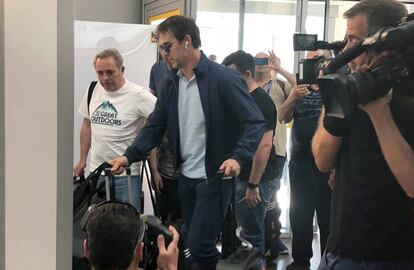‘La Roja’ left in the lurch: The inside story of the Spain coach sacking
The sudden intrusion of Real Madrid in the national team’s World Cup campaign saw a dramatic day unfold on Wednesday, culminating in the firing of Julen Lopetegui and his hasty replacement

The sudden intrusion of Real Madrid in the future of the Spanish national soccer team has sparked the biggest crisis in the history of the sport in Spain. Events on Wednesday, which were precipitated by the announcement by the Madrid club that the national coach, Julen Lopetegui, had been signed for the upcoming season, sparked the firing of the latter, just two days before the team’s debut match in the Russia 2018 World Cup.
The fact that Lopetegui had negotiated the deal behind the back of the Spanish Royal Football Federation (RFEF) saw the coach fired before a replacement had even been confirmed. The president of the RFEF explained his decision: “We are obliged by a set of values,” he said. “An employee cannot leave the federation out of a parallel negotiation until five minutes before it becomes public.”
The fact that Lopetegui negotiated the deal behind the back of the Federation saw the coach fired before a replacement had even been confirmed
Coincidence or not, the crisis caught up with Rubiales on Tuesday at the FIFA Congress in Moscow, 1,400 kilometers from the Spanish team’s camp. In the Russian capital he received a call from Real Madrid that warned him that Lopetegui was going to be their manager next season, and that they would be announcing the appointment in the next five minutes. Stunned by the news, Rubiales – who has not revealed the person from the club who made the call – asked for the announcement to be delayed. But the request by the president – who was completely unaware of the deal – was unsuccessful. According to sources from Real, however, Rubiales did not make any such request. “The only thing that Rubiales asked Julen for was to wait until Wednesday to hold a press conference and to be able to speak together,” Eleonora Giovio reports.
But at the exact same time, Lopetegui was already telling his players that he had been signed by Real. Those from the Madrid club already knew – the rest were completely unaware. Not even Fernando Hierro – then the RFEF sporting director, but now Lopetegui’s replacement – knew what was happening.
After the phone call from Madrid, the Spain base camp in Krasnodar went into meltdown. The RFEF press department called the media to a joint press conference between Rubiales and Lopetegui for 10.30am CET (11.30am local time). After a 90-minute delay, only the president appeared to speak. There was no sign of the coach, who had met previously with his players. Rubiales called on reporters for “understanding” and “no more than five or six questions.” Just 48 hours before the team’s opening World Cup match against Portugal, and the La Roja bench was empty.
After the phone call from Madrid, the Spain base camp in Krasnodar went into meltdown
The team’s players expressed their wishes to see Lopetegui continue in his role until the tournament was over for Spain. “I have spoken to the players and we are all very upset,” Rubiales told the press. “The situation is very complicated, but they have guaranteed that they will do everything possible during the championship. I know that whatever I did was going to be criticized, but I have to act responsibly.
“I don’t feel betrayed,” he continued “But another thing is the way that things have been done.”
Once Rubiales had finished his press conference, the RFEF announced that Lopetegui would be speaking. But an hour later, the press department did an about-turn. “Julen Lopetegui has postponed his appearance before the media until he arrives in Spain,” was the official line.
La Roja had been torn apart. And Rubiales needed a coach, fast. The only options on hand were Albert Celades, from the under-21 team, or Fernando Hierro, who, in the 2016-2017 season, had his first and only experience on the bench when he coached Real Oviedo in the Second Division (his record was 15 wins, eight draws and 15 losses).
To top it all off, with the Portuguese team on the horizon – whose captain, of course, is Real Madrid superstar player Cristian Ronaldo – the Spanish team had a training session scheduled for 7.30pm local time. And there was another problem. Lopetegui was not headed to Real Madrid alone, but would be taking his assistants: Pablo Sanz (assistant coach), and Óscar Garro (fitness coach).
By around 3pm, and with the international press as stunned as the Spanish, Hierro’s appointment was confirmed
By around 3pm, and with the international press as stunned as the Spanish, Hierro’s appointment was confirmed. By 5.15pm, Lopetegui and his assistants headed off to the airport in a white van. They had a 7pm flight to Madrid via Moscow. “I’m very said, but I hope that we win,” was all that Lopetegui had to say.
While the now ex-coach headed back to Spain, it was the turn of his new replacement to speak to the press. He tried to send out a message of optimism. “We have a great opportunity,” he said. “The circumstances are what they are, and we have to face the tournament with bravery.” And what was his plan? “In two days I can’t touch what has been done in two years,” he replied. “I have said to the players that I can look them in the eyes, that I have a clean conscience, and what has happened will not be any kind of justification.”
Hierro and Rubiales have agreed to meet after the Russian trip is over. Only then will they consider whether or not the Málaga-born coach will continue in the role. For now, Hierro will count on the services of Julián Calero and Juan Carlos Martínez as his assistants – both of whom were recruited from Spain, having worked in the past with Lopetegui at Oporto, and with Hierro.
“I couldn’t say no to the national team,” said Hierro on Wednesday. The same thing that Lopetegui must have felt about Madrid – even if it did leave La Roja completely in the lurch.
English version by Simon Hunter.
Tu suscripción se está usando en otro dispositivo
¿Quieres añadir otro usuario a tu suscripción?
Si continúas leyendo en este dispositivo, no se podrá leer en el otro.
FlechaTu suscripción se está usando en otro dispositivo y solo puedes acceder a EL PAÍS desde un dispositivo a la vez.
Si quieres compartir tu cuenta, cambia tu suscripción a la modalidad Premium, así podrás añadir otro usuario. Cada uno accederá con su propia cuenta de email, lo que os permitirá personalizar vuestra experiencia en EL PAÍS.
¿Tienes una suscripción de empresa? Accede aquí para contratar más cuentas.
En el caso de no saber quién está usando tu cuenta, te recomendamos cambiar tu contraseña aquí.
Si decides continuar compartiendo tu cuenta, este mensaje se mostrará en tu dispositivo y en el de la otra persona que está usando tu cuenta de forma indefinida, afectando a tu experiencia de lectura. Puedes consultar aquí los términos y condiciones de la suscripción digital.









































